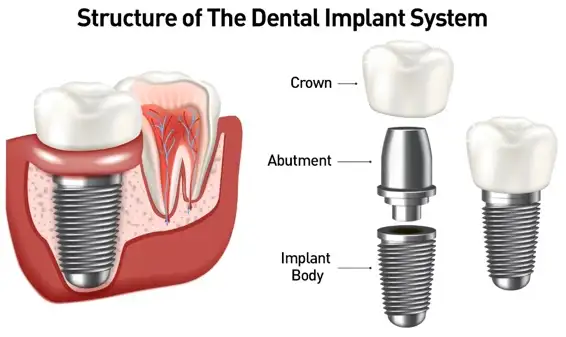Dental implants have completely changed the field of implant dentistry, offering a permanent and aesthetically pleasing solution for tooth loss. But what are dental implants exactly, and how can they help you regain your smile?

In this section, we will delve into the world of dental implants and explore their incredible capabilities. From the benefits they provide to the procedure itself, we will uncover the secrets behind this life-changing dental innovation.
Key Takeaways:
- Dental implants offer a transformative solution for tooth replacement.
- Implant dentistry can restore your smile and boost your confidence.
- The procedure involves the placement of dental through oral surgery.
- Dental implants provide a lasting and natural-looking tooth replacement option.
- Proper care can help dental last for many years.
The Dental Implant Procedure: A Lasting, Natural-Looking Solution
Are you considering dental implants to restore your smile? In this section, we will explore the dental implant procedure and its various aspects. From oral surgery to cost considerations, we will provide you with the information you need to make an informed decision.
Oral Surgery and Dental Implants
When it comes to dental implants, oral surgery plays a crucial role. During the procedure, a dental implant, typically made of titanium, is surgically placed into the jawbone to replace the missing tooth root. This provides a stable foundation for the dental crown or bridge that will be attached later.
While the idea of oral surgery might seem daunting, rest assured that local anesthesia is administered to ensure your comfort throughout the procedure. Our experienced oral surgeon will ensure that you are informed and relaxed every step of the way.
The Cost of Dental Implants
Now, let’s address the question that often arises: how much do dental implants cost? The cost of a dental implant can vary depending on several factors, such as the complexity of the case, the number of implants required, and any additional procedures that may be needed, such as bone grafting.
While dental implants may initially seem more expensive than other tooth replacement options, they offer long-term benefits that make them a worthwhile investment. With proper care, dental implant can last a lifetime, making them a cost-effective solution in the long run.
To give you a rough estimate, the average cost of a single dental implant in the United States ranges from $3,000 to $6,000. However, it’s important to note that each case is unique, and we recommend scheduling a consultation with our dental implant specialist to obtain an accurate cost estimate based on your specific needs.
Don’t let the cost deter you from considering dental implants. We offer flexible financing options to make the treatment more affordable for you. Your smile is priceless, and we are committed to helping you achieve the beautiful, natural-looking results you desire.
Alos More Reads >>> ProDentim Reviews
In Conclusion
The dental implant procedure is a lasting, natural-looking solution for tooth replacement. With oral surgery as the foundation, dental implants offer stability, comfort, and durability. While the cost may vary depending on individual circumstances, dental implant are an investment in your oral health and overall well-being.
Implant-Supported Restoration: Permanent Tooth Replacement Options
In the quest for a durable and long-lasting solution for tooth replacement, implant-supported restoration emerges as a standout option. This innovative approach offers a permanent replacement for missing teeth, ensuring both functionality and aesthetic appeal.
Implant-supported restoration involves the placement of dental implants, which are artificial tooth roots made of biocompatible materials such as titanium. These implants are surgically inserted into the jawbone, providing a strong and stable foundation for the replacement teeth.
There are different types of dental implants available, each suited to specific situations and patient needs. The two most common types include endosteal implants, which are implanted directly into the jawbone, and subperiosteal implants, which are placed under the gum tissue but above the jawbone.
Implant-supported restoration offers several significant advantages over other tooth replacement options. Not only do dental implants provide excellent stability and support for artificial teeth, but they also help to prevent bone loss in the jaw. This ensures a more natural appearance and helps to maintain facial structure.
One of the most common questions patients have is regarding the longevity of dental implant. How long do dental implants last? With proper care and maintenance, dental implant can last for many years, even a lifetime for some patients. This makes them an excellent investment for those seeking a permanent tooth replacement solution.
Proper care for dental implant includes regular brushing, flossing, and routine dental check-ups. It is essential to maintain good oral hygiene habits and avoid habits that can damage the implants, such as biting on hard objects or using tobacco products.
In summary, implant-supported restoration offers a permanent and durable solution for tooth replacement. With their ability to provide stability, prevent bone loss, and last for many years, dental implants are a popular choice for those seeking a long-lasting and natural-looking smile.
The Downsides of Dental Implants: Addressing Common Concerns
When considering dental implants as a tooth replacement option, it’s important to be aware of both the benefits and potential downsides. In this section, we will address some common concerns related to dental implant and provide you with the information you need to make an informed decision.
First, let’s talk about the different types of dental implants. There are three main types: endosteal implants, subperiosteal implants, and zygomatic implants. Endosteal implants are placed directly into the jawbone, while subperiosteal implants are positioned on top of the jawbone. Zygomatic implants, on the other hand, are designed for patients who have insufficient bone in their upper jaw. Each type of implant has its own advantages and is suitable for different cases.
Now, you might be wondering, how painful is the dental implant procedure? While discomfort can vary from person to person, it’s important to note that dental implant surgery is typically performed under local anesthesia, ensuring minimal pain during the procedure. Additionally, your dentist will provide you with aftercare instructions and medication to manage any post-operative discomfort. Remember, the long-term benefits of dental implant often outweigh the temporary discomfort!
Lastly, let’s discuss the potential downsides of dental implants. Like any surgical procedure, there are risks involved, such as infection, nerve damage, or sinus problems. However, these complications are rare and can be minimized through proper planning and the expertise of a skilled dental professional. It is essential to choose a qualified dentist who specializes in implant dentistry, as their experience and knowledge will greatly reduce the likelihood of complications.




